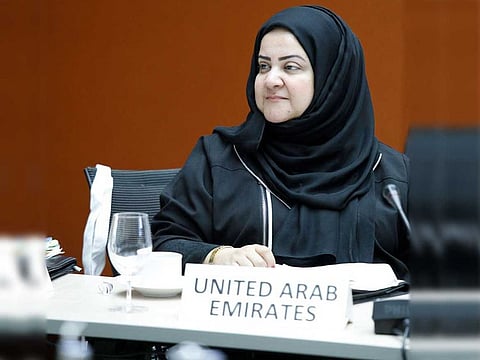UAE’s shares journey in enhancing air quality
Emirates first in the Middle East to join Climate and Clean Air Coalition board meetings

HIGHLIGHTS
- UAE delegation highlights the National Air Quality Agenda 2031.
- UAE presents ways to reduce air pollution at Climate & Clean Air Coalition 2023 board meetings in Bangkok.
- UAE Ministry of Climate Change and Environment represented the UAE, making it the first country from the Middle East to join, actively participate in these board meetings.
Dubai: The UAE’s expertise in enhancing air quality and effectively reducing pollution was highlighted at the Clean Air and Climate 2023 conference in Bangkok.
The UAE delegation from the Ministry of Climate Change and Environment also highlighted the National Air Quality Agenda 2031. The Emirates has declared 2023 as the Year of Sustainability and the country is preparing to host the Conference of the Parties (COP28) in November.
The UAE delegation stressed their significant efforts and initiatives towards improving air quality and reducing air pollution at the conference, which attracted a wide range of international experts and decision-makers.
Air quality index
Eng. Aisha Mohamed Abdullah Al Abdooli, Director of Green Development Management at the Ministry of Climate Change and Environment highlighted the country’s launch of the Air quality index of the UAE. This tool displays the real-time air quality status of the country and monitors it using satellite technology.
The National Air Quality Platform, which receives data from 31 monitoring stations across the various emirates, serves as a singular reference point for real-time air quality in the country, providing the community with the information they need to avoid areas of high pollution.
Furthermore, the delegation highlighted the National Air Quality Agenda 2031, approved by the Council of Ministers in June 2022. This agenda primarily focuses on leading and coordinating activities between federal and local institutions to ensure effective air quality monitoring, management, and pollution reduction.
Contribution
The delegation pointed out that the National Air Quality Agenda aligns with the country’s Nationally Determined Contributions. This will contribute to balancing initiatives to improve air quality and initiatives included in the Nationally Determined Contributions to mitigate the impacts of sectors producing air pollutants and greenhouse gas emissions.
The Clean Air and Climate 2023 Conference discussed several key climate and air quality topics. During its sessions, the latest insights, developments, and best innovative solutions to address air pollution and its impacts on climate change were reviewed.
There were presentations given on technological and industrial solutions for air quality management, success stories and clean air priorities, integrated planning and cooperation among stakeholders, scientific bases and best practices to support policies, promoting a pollution-free economy, and raising awareness towards this issue.
On the sidelines of the conference, a delegation from the Ministry of Climate Change and Environment attended a meeting with the Climate and Clean Air Coalition board, which the country joined this year, making the UAE the first Middle Eastern country to join and participate in the board meetings.
The board is responsible for making decisions on behalf of the Coalition, presenting reports at each annual conference, and is the leading authority entrusted with making decisions related to the Coalition’s trust fund.
Strategic directions
Eng. Aisha Al Abdooli said: “The Board of Directors of the Alliance acts as the body that plans policies and strategies that support the Alliance, including those related to the Conference of the Parties (COP). The UAE’s membership in the Board of Directors of the Alliance will enhance the country’s priorities linked to its presidency of the COP28 conference, which the UAE is hosting this year.”
She added: “As a member of the Board of Directors, the UAE can determine the strategic directions and future funding decisions of the Alliance, enhancing the country’s efforts to reduce harmful emissions. Its membership in the Council will serve as a platform to become acquainted with the latest and best capabilities and experiences in reducing emissions.”
80 state partner countries
The Climate and Clean Air Coalition is composed of 80 state partner countries, organisations, and relevant institutions, including the UAE, the United States - Co-Chair, Ghana - Co-Chair, Argentina, Canada, Colombia, the European Commission, India, Ireland, Japan, Switzerland, the United Nations Food and Agriculture Organization (FAO), the World Bank, Clean Air Task Force (CATF), World Resources Institute (WRI), and the Scientific Advisory Panel (SAP).
On another note, the participating delegation met with Martina Otto, Head of Secretariat, Climate and Clean Air Coalition (CCAC), who welcomed the country’s joining of the Coalition’s board of directors. The meeting discussed the efforts of the UAE in managing air quality and plans, in addition to areas of cooperation between the two parties.
During the meeting, Martina Otto praised the UAE’s efforts in combating climate change, mitigating its repercussions, and supporting global initiatives.
Climate and Clean Air Coalition
The UAE became a member of the Climate and Clean Air Coalition in 2019 and pledged to contribute to reducing methane emissions by 30% globally. The Coalition is a voluntary alliance involving governments, international governmental bodies, corporations, research institutions, and non-governmental organizations. The Coalition’s primary goal is improving air quality and mitigating climate change effects by taking measures against short-term climate pollutants. The United Nations Environment Programme provides a platform for the Coalition.
The Coalition focuses on reducing short-lived climate pollutants (SLCPs), which include elements like methane, black carbon, and hydrofluorocarbons. Their efforts span various sectors, such as agriculture, refrigeration, transportation, energy, oil, gas, and waste management.



